'The town is completely dead - we need more help'
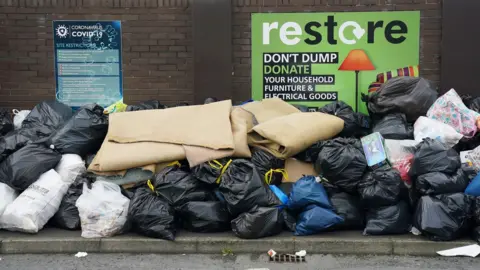 PA Media
PA MediaWe are 10 years on from the biggest change in local democracy in Northern Ireland.
When the super-councils were formed in 2015, they promised more efficiency and better delivery of services.
BBC News NI visited Newry, Mourne and Down District Council and Mid Ulster Council to see how much the super-councils have delivered.
Business rates
As well as domestic rates, one of the key incomes for councils is business rates.
This week homes and businesses will be receiving their rates bill for 2025/26.
Each council sets an annual district rate for their area in Northern Ireland.
It helps pay for public services and projects such as events, tourism, and waste management.
The council fees come in the form of domestic and non-domestic rates, while there is a regional rate set by Stormont.
But with retail habits changing many towns are experiencing increased vacancy on the high street.
At the same time the amount business owners are charged is rising.
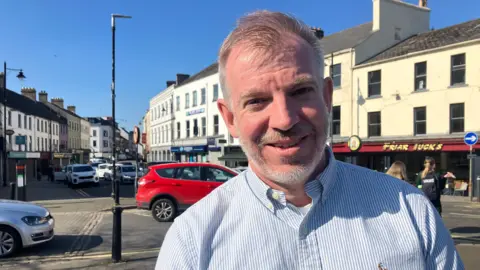
Eamonn Connolly is the head of Newry BID, an organisation representing local businesses. He believes the current rates system is killing the high street.
"Rates are an unfair business tax and the net result of that is it expedites vacancies in our urban centres," he said.
"If the current trajectory continues over the next 10 years then we are into a further period of dereliction, of hollowing out our urban cores."
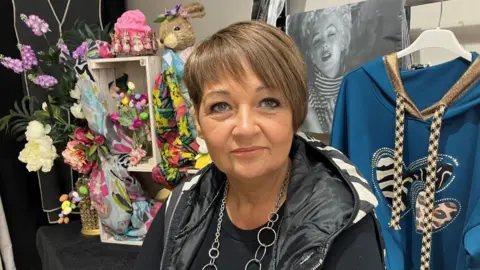
This is a view shared by Karen Knox of K-Chic boutique in Downpatrick.
She said: "I've been in the fashion industry for 20 odd years and there has been a huge change in footfall. The town is completely dead.
"We need more help."
Bins and pay
When super councils formed one of the immediate problems was bringing together staff from different organisations, working to different terms and conditions.
Despite lengthy negotiations, by 2022 these matters had still not been resolved.
With the cost-of-living crisis reaching its peak, below inflation pay offers were the touch paper for industrial action.
There were bin strikes in a number of council areas, the biggest of which was in ABC.
The council saw a mammoth six-week bin strike where mountains of waste lined highways as more than half a million bins went uncollected.
Alan Perry from the GMB union was heavily involved in that strike.
Although the rubbish is long cleared, Mr Perry said issues still remain.
"There are still negotiations in some councils about harmonisation about terms and conditions and this is causing a lot of anger and frustration among the thousands of council staff – many of whom are low paid."
Parking

Super councils have managed off-street car parks since April 2015.
A perceived disparity in parking regulations is also felt in many council areas.
Matthew O'Connor manages McAtamney's butcher shop in the middle of Maghera where parking is largely free.
But in Dungannon and Magherafelt there is paid parking despite them being in the same council area.
"I know parking charges can put people off sometimes, so I understand why businesses in other towns feel frustrated, so I appreciate we're very lucky that parking is free," said Matthew.
He added: "Having said that I still think that there isn't enough parking in Maghera, we would really benefit from another couple of big car parks."
Identity
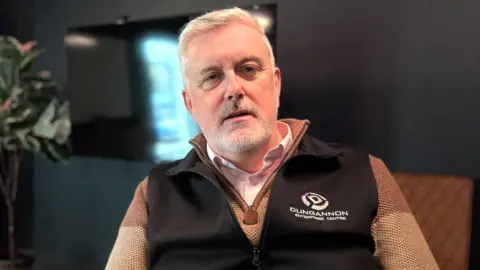
As well as merging staff, super councils have also faced a challenge in terms of shaping new identities.
Brian McAuley, the chief executive of Dungannon Enterprise Centre, said many don't identify as being from Mid Ulster.
"Mid Ulster Council area is effectively a big strip around the middle of Northern Ireland that takes in areas that don't always feel that connected," he said.
"I still see myself as a Dungannon man, a Tyrone man, I don't see myself as a Mid Ulster man, and when I talk to people from Cookstown, Bellaghy, Magherafelt, they often say the same.
"Their identity is where they live."
The future
Since their inception, many of the new councils have worked towards their own development plans such as the South Lakes Centre in Craigavon.
But many other council plans now look beyond what their traditional remit has been to include projects including bypasses.
For example, the Belfast Region City Deal of which Newry, Mourne and Down council is a partner includes funding for the southern relief road bypass in Newry.
In Mid Ulster, the council has pointed to progress on the Cookstown bypass which had funding secured through the Mid South West Growth Deal.
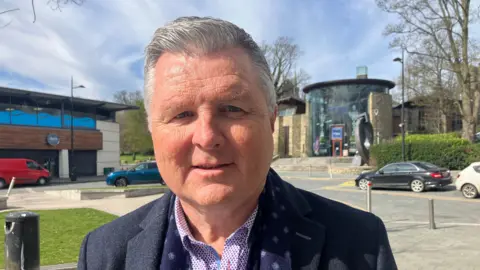
The council also said it is working towards a Dungannon bypass.
Malachy McGrady heads ups Downpatrick's regeneration working group.
"Can more be done? Absolutely, can council be more creative? Absolutely," he said.
"But it is going to take time. Nothing changes with a quick fix but we are all giving our time and effort to make a difference."
Many of the challenges have been within council's gift. Others less so.
Strikes, lockdowns, floods, changing retail habits, building bans and planning delays have all had a bearing on delivery – and that's even before political differences in the council chamber are taken into consideration.
At their inception the new councils promised savings over a 25-year period – so perhaps the real marker of performance will be over the next, rather than the initial, 10.
